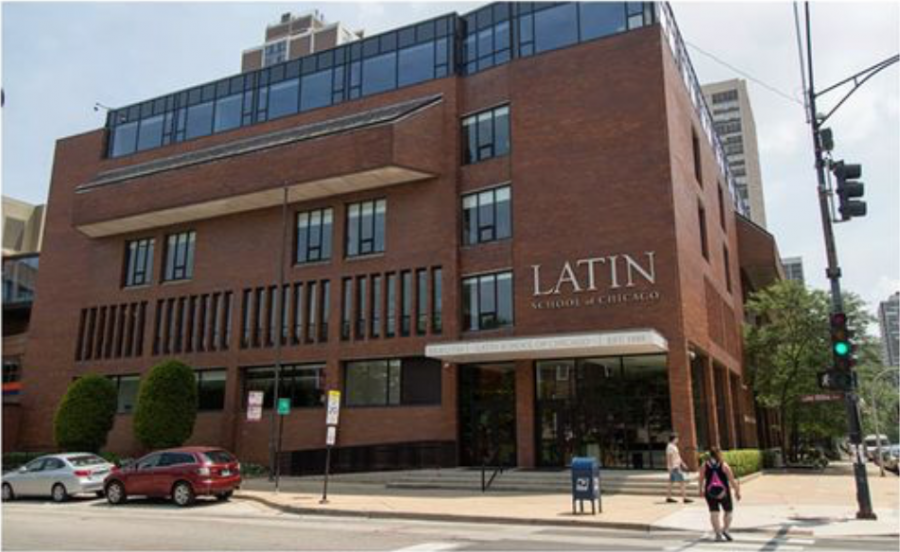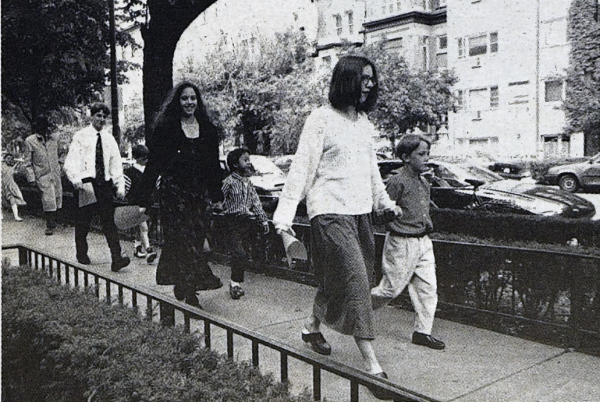Latin Parents Embrace ‘What is Race’ Crash Course
The Latin School as seen from North Ave
Latin’s “What is Race?” is a 10th-grade history elective that has been a highlight of many students’ experience in the Upper School. This year, Latin hosted a series of lessons for parents modeled after the course.
Mikayla Smey, a sophomore who is currently taking the class, said, “I love ‘What is Race?’ because we do a lot of complex discussion in class, which is a great format for this topic because it allows a wide range of viewpoints to be heard.”
Madison Vanderbilt, a junior who took the elective in the spring of last year, agreed with Mikayla, saying, “It’s just a good class!”She continued, “I loved ‘What is Race?’ because it didn’t tell me what to think, yet gave me the tools to think critically about race and racism. I learned the complex history of American racism and our position and responsibility as educated people to respond to racism.”
But why did Latin choose to offer this class to parents out of the multitude of engaging classes at the school? White Identities and Anti-Racism Coordinator and English teacher Kate Lorber-Crittenden said, “I wanted to create an opportunity where parents could learn as students do.” She chose to make a modified version of the ‘What is Race?’ class because “a lot of folks don’t know that the ideas of whiteness and blackness have been constructed over time, even in the ways our laws are written.”
The parents’ version of the class, dubbed “Latin Learners Mini-Course on the History of Race and Racism,” is facilitated by Ms. LC and other members of the Diversity, Equity, and Inclusion team, including Dean of Community Learning Suzanne Callis and DEI Curriculum Coordinator Brandon Woods. Though only instated one year ago, the mini-course is not short of sign-ups, averaging around 85 applicants per session, of which 50 parents completed the course.
Parents can sign up for the mini-course via updates sent by the Communications Office. After receiving all the applications, Ms. LC reaches out to the applicants as a group to begin the course.
Ms. LC said,“The class is based exactly on the materials and content that students in the high school study.” She added, “It’s an opportunity [for parents] to be a student again.”
Though the content of the mini-course is quite similar, the workload is not. In consideration of Latin parents’ full-time jobs and other important duties, parents who take the class will not be assigned the typical amount of homework that students are given.
Rather, parents will only have to complete asynchronous work, including engaging with several different historical resources regarding the construction of race. The typical workload includes one and a half to two hours of reading and 20 to 30 minutes of reflection questions that will be discussed in the next session of the mini-course. The group meets on Saturdays every week via a 90-minute Zoom call.
Latin has offered booktalks in conjunction with the parents’ association and such in the past, but the mini-course is the very first course that the school is offering to parents that is not a one-off session. “Offering for parents and guardians can be a lot of information out, and a lot of different parts of the community have tried to create ways of meaningful engagement for parents and guardians,” Ms. LC said.
Ms. LC further noted, “Particularly for identity-based conversations, there’s a lot of personal connection and varying understandings depending on the identities we’re discussing.” and that “People have such varying experience with one, discussing race at all, and two, what it actually is and how to engage in those conversations crossracially. Sustained dialogue is one of the best ways to practice skills and build trust in a way that really can create actual community and learning and hold folks accountable.” She said, “It’s hard to build community if you get together to have a conversation about one thing at a time—that’s the most simplified way I can say it.”
Though the course is optional, the ways in which race affects society as a whole raises the question of whether this course should be mandatory for students.
Ms. LC said, “The folks who have signed up to be there, they’re there because they genuinely want to learn it. You don’t generally have people sign up who aren’t even a little bit curious about the topic.”
That being said, Mikayla noted, “This is a class everyone should take. It gives you an in-depth look at our own history in a nuanced way and connects back to issues in the present. The real-world consequences of race and racism are astounding. It is hugely eye-opening and the type of education everyone should have access to.”
Mikayla added, “These topics aren’t meant to make you feel safe; they should be hard conversations. A safe space silences people, brave spaces let us all grow. Mistakes will be made, and we will learn from them together.”
As to whether there would be any more courses of its kind in the future, Ms. LC said, “I think the school might start more courses for parents.” Although, she added, “one of the challenges is that I also teach high school students full-time, so this role is additional.”
Regardless of the challenges, Ms. LC said, “I would love for there to be more classes like this.”

Sofia Grimm ('25) is excited to serve as Opinions Editor this year! Her fourth year writing for The Forum, Sofia has been in various roles at The Forum...




















































